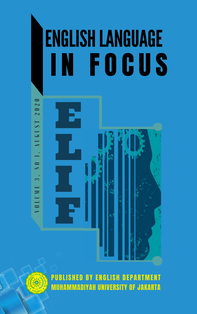Promoting Reading Comprehension Among English Language Learners: KWLS Technique
DOI:
https://doi.org/10.24853/elif.3.1.31-38Keywords:
KWLS Technique, reading Comprehension.Abstract
Reading is a complex linguistic process in which students have a deeper knowledge of how to interpret reading texts. Teachers need some informative methods to stimulate student motivation in the learning process to improve students reading capabilities. Based on the research purpose, the researcher decided to implement the KWLS technique at STIE Muhammadiyah Tanjung Redeb East Borneo. This study was Classroom Action Research (CAR) which covered standardized indicators suggested by Kemmis and McTaggart, including planning, observing, implementing, and reflecting. As the results of this research, it indicated that the technique can provide an opportunity for students to develop their reading comprehension and to meet a minimum standard of passing. After conducting the study, the researcher found that the KWLS technique was very successful in increasing students' reading comprehension. The improvements in the student's passing grade have been revealed or no student with a low score in the second cycle.References
Attaprechakul, D. (2013). Inference Strategies to Improve Reading Comprehension of Challenging Texts. English Language Teaching, 6(3), 82–91. https://eric.ed.gov/?id=EJ1076837
Brown, H. D. (2007). Principles of Language Learning and Teaching. Pearson Longman.
Fachrurrazy. (2012). Teaching English as a Foreign Language for Teachers in Indonesia. State University of Malang Press.
Fang, Z., & Schleppegrell, M. J. (2010). Disciplinary Literacies Across Content Areas: Supporting Secondary Reading Through Functional Language Analysis. Journal of Adolescent & Adult Literacy, 53(7), 587–597. https://doi.org/10.1598/jaal.53.7.6
Fengjuan, Z. (2010). The Integration of the Know-Want-Learn (KWL) Strategy into English Language Teaching for Non-English Majors 1. Chinese Journal of Applied Linguistics, 33(4), 77–86.
Grabe, W., & Stoller, F. L. (2019). Teaching and Researching Reading. In Teaching and Researching Reading (3rd ed.). Routledge. https://doi.org/10.4324/9781315726274
Hadi, M. S., & Izzah, L. (2018). Problem Based Learning (PBL) in Teaching English for Students of Primary School Teacher Education Department. English Language in Focus (ELIF), 1(1), 45–54. https://doi.org/10.24853/elif.1.1.45-54
Hornby, A. S. (2015). Oxford Advanced Learner’s Dictionary of Current English. Oxford University Press.
Hudson, R. F., Torgesen, J. K., Lane, H. B., & Turner, S. J. (2012). Relations among Reading Skills and Sub-skills and Text-level Reading Proficiency in Developing Readers. Reading and Writing, 25(2), 483–507. https://doi.org/10.1007/s11145-010-9283-6
Izzah, L., & Hadi, M. S. (2018). Systemic Functional Genre on Students’ Reading Literacy. English Language in Focus (ELIF), 1(1), 35–44. https://doi.org/10.24853/elif.1.1.35-44
Kemmis, S., & McTaggart, R. (2005). Participatory Action Research: Communicative Action and the Public Sphere. In N. K. Denzin & Y. S. Lincoln (Eds.), The Sage handbook of qualitative research (pp. 559–603). Sage Publications Ltd.
Ogle, D. M. (1986). K-W-L: A Teaching Model That Develops Active Reading of Expository Text. Reading Teacher, 39(6), 564–570. https://www.jstor.org/stable/20199156
Pang, E. S., Muaka, A., Bernhardt, E. B., & Kamil, M. L. (2003). Teaching Reading: Educational Practices Series. [International Bureau of Education]. http://www.ibe.unesco.org/
Sheehan, K. M. (2017). Helping Students Select Appropriately Challenging Text: Application to a Test of Second Language Reading Ability. ETS Research Report Series, 2017(1), 1–17. https://doi.org/10.1002/ets2.12160
Downloads
Published
Issue
Section
License
Authors who publish with this journal agree to the following terms:
- Authors retain copyright and grant the journal right of first publication with the work simultaneously licensed under a Creative Commons Attribution License that allows others to share the work with an acknowledgment of the work's authorship and initial publication in this journal.
- Authors can enter into separate, additional contractual arrangements for the non-exclusive distribution of the journal's published version of the work (e.g., post it to an institutional repository or publish it in a book), with an acknowledgment of its initial publication in this journal.
- Authors are permitted and encouraged to post their work online (e.g., in institutional repositories or on their website) before and during the submission process, as it can lead to productive exchanges, as well as earlier and greater citation of published work (See The Effect of Open Access).

